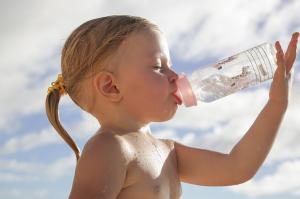Why it's so Important to Avoid Being Dehydrated
While dehydration can be dangerous to our health the opposite is true: when we're optimally hydrated, our cells can work properly.
Conversely, when our bodies are properly hydrated, the cells can work properly to detox, cleanse, metabolise energy, conduct electrical signals and carry out cardiovascular function.
The reason people often end up being dehydrated is because our thirst mechanism can become unreliable, especially as we get older, so if we don’t feel thirsty we often don't drink water and we become dehydrated.
As quoted on the website Health Facts: "A mere 2% drop in your body's water supply can trigger signs of dehydration. It is estimated that the majority of people are mildly or chronically dehydrated. Mild dehydration is one the most common causes of daytime fatigue."
When diagnosing dehydration, there’s no standard test. Doctors can check for biomarkers in the blood and urine as well as blood pressure assessments, but they usually diagnose it by observing clinical symptoms such as eye dryness, mouth mucous wetness and dark urine. Other symptoms include headaches, brain fog, or heart palpitations. Even anxiety can be a symptom of dehydration.
Our brain uses huge amounts of water for its electrical activity and processing. In fact, about 80% of our brain is made of water. The availability of free water, together with electrolyte minerals, is essential for electrical conductivity and cell signalling in the body.
It's interesting how many factors can cause dehydration. We can become dehydrated because of excessive perspiration, eating too much processed food, ingesting chemicals (such as glyphosate) or certain medications such as diuretics (i.e. medications which cause the kidneys to release excessive water).
Beverages such as coffee, black tea or alcohol can actually remove more free water from the body than they donate in liquid, so it's important to drink extra water to compensate after drinking these beverages.
Highly-processed salty foods and sugar are also dehydrating. Excessive sodium can also push up blood pressure, so for those with hypertension, care should be taken when adding sodium to foods and beverages. Sodium is of course vital, but it must be balanced with enough magnesium. Magnesium helps to normalise blood pressure if you can get the right amount and balance. Natural spring water and magnesium-rich foods are a good source.
The recommended optimal water consumption per day for adults is 2.5 to 3 litres, and more if you perspire a lot or are exposed to dehydrating foods or drugs. Additionally, it's possible to take in enough water but to excrete it too quickly via urination. This can happen when people have kidney (renal) health issues because the kidneys are responsible for water regulation in the body.
If people also excrete too many minerals, the water levels in the body drop too and it becomes difficult to regulate the body's pH, which leads to metabolic acidosis. This in turn effects metabolism, blood pressure and glucose levels. In this case, the goal is to keep the water working inside cells for adequate hydration and buffering of acids.
Magnesium is essential for the electrolyte balance of the body. Research has found that water is more hydrating if it contains magnesium electrolytes. Potassium and magnesium electrolytes work together as intracellular partners, while the extracellular dominant electrolytes are sodium and calcium. If magnesium drops too low the balance of other electrolytes becomes disrupted.
Natural spring water containing magnesium is the ideal water to drink for good hydration, as minerals make the water more alkaline, palatable, and easier to drink, compared to demineralised or filtered water without minerals.
Magnesium is a vital component in the electrolyte mix, as it has the most important relationship with water. Magnesium has the largest hydration shell of any electrolyte: “Its radius is 400 times larger than its dehydrated radius. This difference between the hydrated and the dehydrated state is much more prominent than in sodium (25-fold), calcium (25-fold) or potassium (4-fold).“
The moisture level in our cells is maintained by the presence of magnesium, and low magnesium levels mean that cells can become more easily dehydrated. Muscles expand and stretch as magnesium brings water into the cells of muscle fibres, and contract because magnesium retreats to allow calcium to enter for contraction. Dehydration caused by low magnesium can cause muscle cramps.
Magnesium’s relationship with water and hydration can be further demonstrated in its capacity to act as a laxative. If you take a strong dose of oral magnesium supplement it attracts water to liquefy stool. However, the low concentration of magnesium in natural spring water does not have a laxative effect, and it's more likely to pass through the gut wall to the interior of the body at low concentrations. Mineral water is also beneficial for gut microbiome health.
The hydration of skin can be enhanced by magnesium and water. If you use topical magnesium in the form of Magnesium Cream or Lotion, the combination of magnesium ions, water and lipids helps the skin barrier to hold in more moisture, improving complexion and youthful appearance. Incidentally, transdermal absorption of magnesium bypasses the digestive system and does not have a laxative effect.
Demineralised drinking water can have deleterious health effects, causing metabolic acidosis and a leeching of vital minerals from the bones. Calcium and magnesium are also needed for protection against uptake or transportation in the body of toxic elements like lead and uranium.
For drinking water which is optimally hydrating for cells, you can add back minerals after filtering it, or if you drink harvested rainwater, you can add the minerals to that. It is recommended that demineralised drinking water be avoided. For drinking water that is optimally hydrating for cells, you can add back minerals after filtering it. Or do the same with harvested rainwater. This will mimic natural spring waters to better hydrate your body.
To find out more about how to remineralise your filtered drinking water using Elektra Magnesium flakes or drops, visit: www.elektramagnesium.com.au
Sandy Sanderson (Elektra Life Pty Ltd)
Elektra Magnesium
+ +61 409307327
email us here
Visit us on social media:
Facebook
Twitter
Other
Magnesium mineral supplement for drinking water
Legal Disclaimer:
EIN Presswire provides this news content "as is" without warranty of any kind. We do not accept any responsibility or liability for the accuracy, content, images, videos, licenses, completeness, legality, or reliability of the information contained in this article. If you have any complaints or copyright issues related to this article, kindly contact the author above.



